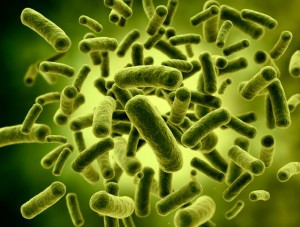Bacteria. For many, that word conjures up images of invasive, invisible monsters that hang out in dirty places and look for opportunities to make us sick.
The truth is less scary – and quite interesting. Bacteria coexist with us, and many do things that help us (like make vitamins, break down waste, aid in digestion, and help plants absorb nitrogen from soil). Yes, there are bacteria that are dangerous (like the ones that cause tuberculosis, cholera, and Lyme disease), but most of the bacteria in your body is made harmless by your immune system.
There are approximately ten times as many bacterial cells in the human body as there are human cells in the body, with large numbers of bacteria on the skin and as gut flora. You have about 10 TRILLION cells in your body – and about 10 times that amount of microorganisms in your gut! It is estimated that 500 to 1000 species of bacteria live in your gut, and about the same amount lives on your skin.
Research suggests that the relationship between gut flora and humans is a mutualistic, symbiotic relationship. This means that it is a mutually beneficial relationship – the microbes need us, and we need them.
So, how do you keep the good and bad bacteria in balance?
Probiotics. Probiotics (the name comes from pro and biota, meaning “for life”) are believed to keep the good and bad bacteria in your gut in check (we don’t want to entirely obliterate the bad bacteria, because it too serves a purpose – we just want more good than bad).
Probiotics are often referred to as “good bacteria”, but they are actually products that contain helpful microorganisms (usually Lactobacillus or Bifidobacterium) that may help with digestion and offer protection from harmful bacteria. The Food and Agriculture Organization of the United Nations (FAO) defines probiotics as “live microorganisms, which, when administered in adequate amounts, confer a health benefit on the host.” Yep – they are alive, and most of them are bacteria. A normal human digestive system contains around 400 types of probiotic bacteria, in addition to “bad” bacteria. The body is designed to balance good vs. evil, but sometimes things like medications, diet, disease, and your environment can interfere.
On that note (here comes a tangent, which IS relevant – I promise) -did you know you have a “second brain” in your gut?
Okay, not literally – there isn’t a tiny brain sitting in your GI tract -but there is an extensive network of neurons (nerve cells that transmit information throughout your body) lining your guts. It is filled with neurotransmitters (chemical messengers), and it does a heck of a lot more than dealing with digestion and giving you “butterflies” when you are nervous. This gut brain has pretty big responsibilities – it partly determines your mental state, and plays a role in diseases throughout your body. (It does NOT help you with decision-making, thought processes, or all that other important stuff – that 3 lb. organ in your head gets to carry that burden.)
This “second brain” is called the enteric nervous system. It contains around 100 million neurons (that’s more than in your spinal cord or peripheral nervous system!). Those neurons are in the walls of your alimentary canal, which is about 9 meters long. It starts with your esophagus and ends with your anus.
The most fascinating part? Your enteric system can control gut behavior INDEPENDENTLY of your brain. So, the brain in your head can deal with things like problem-solving while your gut brain deals with the dirty work in your digestive tract.
What is my point here? Well, as you see, taking good care of your digestive tract is probably a good idea. It has some important jobs to handle, like digesting food, synthesizing vitamins and nutrients, metabolizing some medications, maintaining gut functioning, and immune system enhancement.
Having a healthy digestive system is important because a healthy system filters out things that can damage it (like that bad bacteria, toxins, chemicals, and waste products). It also helps us absorb and deliver the good stuff like nutrients from our food.
Perhaps the most important thing probiotics can do for you involves your immune system. If your immune system isn’t working correctly, conditions like allergic reactions, autoimmune disorders (including colitis, Crohn’s, and arthritis), and infections can start coming around. Keeping your good and bad bacteria in balance may be able to help prevent or help with those conditions.
It is possible that healthy gut bacteria play a role in weight loss, as this fascinating article from Mother Jones explains.
Probiotics can be found in many forms, including capsules, tablets, powders, and foods like yogurt and dairy drinks. Experts say that the form doesn’t matter, but the amount of organisms does. The effective dose varies from as little as 50 million to as many as 1 TRILLION live cells per dose. Many companies provide information to help you choose the right product for your needs, and many have done their own research studies, or provide information on the scientific studies they use.
This article was originally published at Ready Nutrition™ on May 5th, 2014







